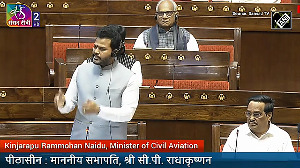Major suggested that federal law could be rewritten to make it easier for intelligence officers to pass along evidence of criminal conspiracies they uncover through wiretaps made for other purposes.
At present, Canadian Security agency CSIS doesn't always share such information with the police because of fears that, if the material becomes part of a criminal prosecution, the spy service will have to disclose everything it knows about a suspect in open court.
Major suggested a mechanism could be worked out to allow the public release of only the specific information needed for a prosecution, with the rest remaining secret.
"You would need some legislative assistance to be able to pick and choose in an appropriate case," the judge interjected during testimony on the subject by Geoffrey O'Brien, a staff lawyer for Canadian security agency, CSIS.
The terrorist bombing of Kanishka jet off the coast of Ireland on June 23, 1985, had killed 329 people, most of them Canadian citizens of Indian origin or descent. After its initial reluctance to disclose some of the secret documents relating to 1985 Air India bombing on grounds of national security, the Canadian government has indicated that it may soon release some of the classified information.
"It seems to me that if there was some legislative protection -- which you could disclose the crime and the events that relate to the crime but not have to disclose beyond that -- that it would be of some comfort to CSIS," Canadian press reported quoting O'Brian.
O'Brien replied that it would indeed be a comfort -- but quickly cautioned that legal difficulties could still arise once a case gets to court. There were difficulties as well in meeting the legal test for admissibility in court of other material, since CSIS is mandated only to gather information and not to engage in law enforcement.
"Intelligence was not collected to be used in court, and when you wanted to use it in court different issues got raised," said O'Brien.
He agreed the June 1985 bombing can be characterised, at least in broad terms, as an intelligence failure. "I think you can start with the general statement that every time something happens like that it's an intelligence failure."
But he resisted placing any specific operational blame and said there's no guarantee better sharing of information between CSIS and the RCMP would have solved all problems.
O'Brien pointed to the recent inquiry into the Maher Arar affair as an example of how sharing the wrong information can produce disastrous consequences -- in Arar's case, deportation and torture in Syria based on faulty intelligence about non-existent ties to al-Qaida that the Mounties passed to US authorities.
O'Brian noted the legal rules for obtaining a wiretap warrant differ markedly between CSIS and the RCMP, with the police required to meet a higher standard for criminal investigation than the spy agency does for monitoring security threats.
A defence lawyer could also argue that partial disclosure of evidence in a court proceeding would violate the Charter of Rights guarantee of a full and fair defence to any charge.
Finally, O'Brien said he has reservations about transforming CSIS into a "cheap cop shop" that provides evidence to the police they couldn't otherwise get.
Major acknowledged there may be legal problems but maintained they're not insurmountable. For example, the law could provide that evidence can only be shared with the approval of a Federal Court judge.
Lack of co-operation between CSIS and the RCMP was a major problem in the investigation of the 1985 Air India bombing that took 329 lives, and part of Major's mandate is to recommend possible reforms.
Although the bombing was blamed on Sikh militants based in British Columbia, only one man has ever been convicted. Another was shot dead by Indian police in 1992 and two more were acquitted in Vancouver in 2005. It's known that CSIS had key suspects under surveillance before the attack.
But translation of some wiretap tapes was delayed by a shortage of Punjabi-speaking staff, and other tapes were erased with only written summaries of their contents retained.





